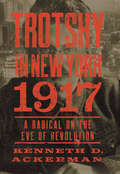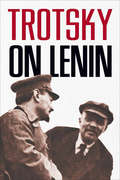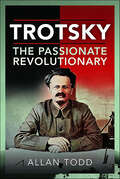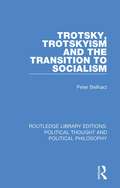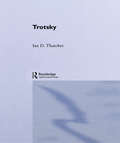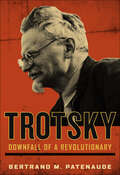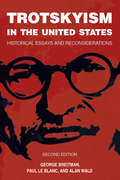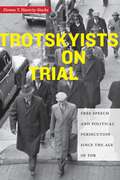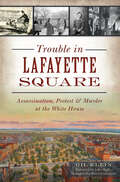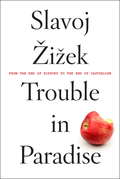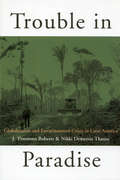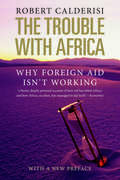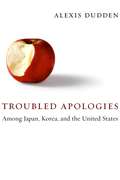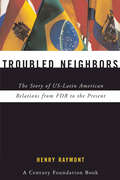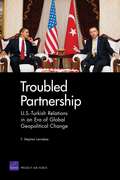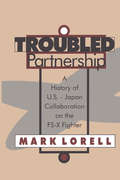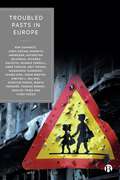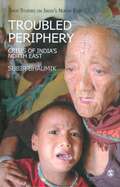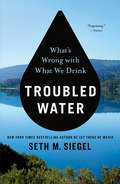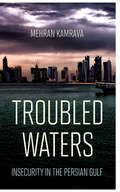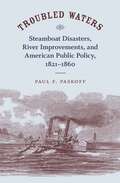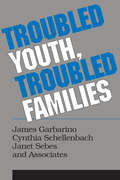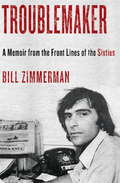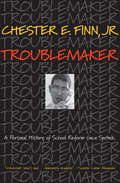- Table View
- List View
Trotsky in New York, 1917: From Times Square to Petrograd
by Kenneth D. AckermanLev Davidovich Trotsky burst onto the world stage in November 1917 as co-leader of a Marxist Revolution seizing power in Russia. It made him one of the most recognized personalities of the Twentieth Century, a global icon of radical change. Yet just months earlier, this same Lev Trotsky was a nobody, a refugee expelled from Europe, writing obscure pamphlets and speeches, barely noticed outside a small circle of fellow travelers. Where had he come from to topple Russia and change the world? Where else? New York City. Between January and March 1917, Trotsky found refuge in the United States. America had kept itself out of the European Great War, leaving New York the freest city on earth. During his time there-just over ten weeks-Trotsky immersed himself in the local scene. He settled his family in the Bronx, edited a radical left wing tabloid in Greenwich Village, sampled the lifestyle, and plunged headlong into local politics. His clashes with leading New York socialists over the question of US entry into World War I would reshape the American left for the next fifty years.
Trotsky on Lenin
by Leon Trotsky&“Fascinating . . . full of insight and a perceptive portrait of Lenin&’s single-mindedness and his relentless, all-consuming drive towards revolution in Russia.&” —The Guardian Combining Young Lenin and On Lenin in one volume, this is a fascinating political biography by Lenin&’s fellow revolutionary, Leon Trotsky. Trotsky on Lenin brings together two long-out-of-print works in a single volume for the first time, providing an intimate and illuminating portrait of the Bolshevik leader by another of the twentieth century&’s greatest revolutionaries. Written shortly after its subject&’s death, On Lenin covers the period of revolutionary struggle leading up to 1917 as well as the early years of Bolshevik power. We see a man totally committed to the revolutionary cause, whose legacy was later corrupted under the Soviet Union&’s Stalinist degeneration. Young Lenin, meanwhile, describes his early years and conversion to Marxism, dispelling many of the myths later created by Soviet hagiography in the process. This is the essential guide for anyone wanting to understand Lenin as a thinker, active revolutionary, and personality.
Trotsky, The Passionate Revolutionary
by Allan ToddAlthough Trotsky was dramatically assassinated just over eighty years ago, he remains a controversial figure. He has had many biographers over the decades - ranging from the overly-sympathetic, to the extremely-hostile. Robert Service, his most recent biographer, expressed the hope that his book would ‘finish off’ Trotsky - a job he believed the ice-axe had failed to do in 1940! This biography, as expected, deals with those aspects for which Trotsky is noted: his passionate and fiery oratory which captivated and inspired huge crowds; organising the Bolshevik Revolution of November 1917; masterminding the creation of the Red Army and ensuring its victory during the Civil War; becoming the most determined opponent of Stalin’s creation of a monolithic party and state; being a Marxist theoretician of socialist revolution and combatting fascism; and, of course, being the originator of the very specific brand of revolutionary socialism that, as early as 1906, became known as Trotskyism. However, this biography also explores other aspects of Trotsky’s life which are not so well-known. In particular, from a very early age, his love of writing: the world of books and publishing became his first passion; it remained his first love and, if revolutionary politics had not taken over, his life would have been a very literary one. Immediately after the November Revolution, he hoped to return to his literary work, believing his main practical work as a revolutionary was over. His writings on art and literature, when compared to the stultifying strictures of the ‘Socialist Realism’ associated with Stalinism, are remarkably sympathetic and open; while he also wrote many perceptive articles as a war correspondent, covering both the Balkan Wars and the early stages of the First World War. Other aspects covered by this biography concern his family life, and his relationships with his children. Also explored is his love-life - while it is known he had a brief affair with the Mexican artist, Frida Kahlo, there are also suggestions he may have had other affairs. Whatever the truth of such allegations, he certainly maintained a passionate relationship with his long-term companion, Natalya Sedova; and readers should be aware that one proof of that, provided towards the end of this book, contains very explicit language.
Trotsky, Trotskyism and the Transition to Socialism (Routledge Library Editions: Political Thought and Political Philosophy #4)
by Peter BeilharzFirst published in 1987. Trotskyists have long dominated the revolutionary tradition on the Western left. Written from a critical socialist standpoint, this book provides an analysis of Trotskyism and argues that Trotskyism is increasingly irrelevant as a means of achieving socialism. It argues that, as the realisation grows that the revolutionary tradition and the authoritarianism which necessarily result from it are wrong, the importance of the problem of the transition to socialism increases. It argues that on this point Trotskyism is weak; that Trotskyism's proposals for socialist transition are largely rhetorical; and that its democratic impulse is weak. It supports this argument by showing that Trotsky’s philosophy of history, implicit in his writings, which the author characterises as evolutionary and necessitarian, coupled with a failure to grasp the moral basis of the socialist case, has a disabling effect on Trotsky's account of the transition to socialism and on his explanation of Stalinism. Moreover, it argues that Trotsky's intellectual and political heirs have been unable to escape from the contradictions inherent in his thought.
Trotsky: August 1914 - February 1917 (Routledge Historical Biographies)
by Ian D. ThatcherThis new biography provides a full account of Leon Trotsky's political life, based upon a wealth of primary sources, including previously unpublished material. Ian D. Thatcher paints a new picture of Trotsky's standing in Russian and world history. Key myths about Trotsky's heroic work as a revolutionary, especially in Russia's first revolution of 1905 and the Russian Civil War, are thrown into question. Although Trotsky had a limited understanding of crucial contemporary events such as Hitler's rise to power, he was an important thinker and politician, not least as a trenchant critic of Stalin's version of communism.
Trotsky: Downfall of a Revolutionary
by Bertrand M. PatenaudeA dramatic chronicle of revolutionary, politician, and political theorist Leon Trotsky’s final years in exile in Mexico.Few political figures of the twentieth century have aroused as much passion, controversy, and curiosity as Leon Trotsky. His role in history—his epic rise and fall, his fiery persona, his violent end in Mexico in August 1940—holds a fascination that transcends the history of the Russian Revolution. Bertrand M. Patenaude masterfully interweaves the story of Trotsky’s final years with flashbacks to pivotal episodes in his career as a young Marxist, revolutionary hero, Red Army chief, Bolshevik leader, outcast from Stalin’s USSR, and ultimately heretic of the Kremlin, targeted for assassination by its secret police. Gripping, tragic, and based on extensive firsthand research, Trotsky brilliantly illuminates the fateful and dramatic life of one of history’s most captivating and important figures.Praise for Trotsky“Excellent, exciting. . . . Trotsky charts with novelistic flair and in archival detail, the progress of the plot that culminated in Trotsky being killed with an ice axe in 1940.” —Simon Sebag Montefiore, The Sunday Times Telegraph (London)“This book deepens and enhances the sense of tragedy that always attends contemplation of “the Old Man” and his last struggle.” —Christopher Hitchens“Betrand Patenaude tells a masterly story of a brilliant, cornered man and, along the way, of a misguided century.” —The Wall Street Journal“A captivating account. . . . Patenaude paints a vivid portrait of Trotsky, a flamboyant, Westernized intellectual. . . . This is a dramatic, event-filled portrait of a turbulent, half-forgotten era.” —Publishers Weekly (starred review)
Trotskyism in the United States: Historical Essays and Reconsiderations
by George Breitman Paul Le Blanc Alan WaldIn the new edition of this definitive work on the history of the revolutionary socialist current in the United States that came to be identified as "American Trotskyism," Paul Le Blanc offers fresh reflections on this history for scholars and activists in the twenty-first century. Includes a preface written especially for the new edition of this distinctive work.
Trotskyists on Trial: Free Speech and Political Persecution Since the Age of FDR (Culture, Labor, History #1)
by Donna T Haverty-StackePassed in June 1940, the Smith Act was a peacetime anti-sedition law that marked a dramatic shift in the legal definition of free speech protection in America by criminalizing the advocacy of disloyalty to the government by force. It also criminalized the acts of printing, publishing, or distributing anything advocating such sedition and made it illegal to organize or belong to any association that did the same. It was first brought to trial in July 1941, when a federal grand jury in Minneapolis indicted twenty-nine Socialist Workers Party members, fifteen of whom also belonged to the militant Teamsters Local 544. Eighteen of the defendants were convicted of conspiring to overthrow the government. Examining the social, political, and legal history of the first Smith Act case, this book focuses on the tension between the nation’s cherished principle of free political expression and the demands of national security on the eve of America’s entry into World War II. Based on newly declassified government documents and recently opened archival sources, Trotskyists on Trial explores the implications of the case for organized labor and civil liberties in wartime and postwar America. The central issue of how Americans have tolerated or suppressed dissent during moments of national crisis is not only important to our understanding of the past, but also remains a pressing concern in the post-9/11 world. This volume traces some of the implications of the compromise between rights and security that was made in the mid-twentieth century, offering historical context for some of the consequences of similar bargains struck today.
Trouble in Lafayette Square: Assassination, Protest & Murder at the White House (Landmarks)
by Gil KleinA unique history of the park across from the White House, and the many tumultuous events that have happened there—includes photos and illustrations. Lafayette Square, near the White House, has been in the spotlight during recent protests—but many are unaware that this Washington, DC, spot is surrounded by landmarks and steeped in a fascinating history of rebellion. A congressman shot and killed the son of Francis Scott Key in broad daylight on the square and got away with it. On the night Lincoln was assassinated, a co-conspirator forced his way into Secretary of State William Seward&’s house and nearly killed him. The women&’s suffrage movement created the tradition of White House protest that goes on to this day, and in 1950, Puerto Rican nationalists tried to force their way into Blair House to assassinate President Truman, who was living there. In this book, prominent Washington journalist Gil Klein recounts these and other stories, bringing to life the rich and sometimes bloody history of this seven-acre public gathering place.
Trouble in Paradise
by Slavoj ZizekIn Trouble in Paradise, Slavoj i ek, one of our most famous, most combative philosophers, explains how we can find a way out of the crisis of capitalism. There is obviously trouble in the global capitalist paradise. But why do we find it so difficult to imagine a way out of the crisis we're in? It is as if the trouble feeds on itself: the march of capitalism has become inexorable, the only game in town. Setting out to diagnose the condition of global capitalism, the ideological constraints we are faced with in our daily lives, and the bleak future promised by this system, Slavoj i ek explores the possibilities--and the traps--of new emancipatory struggles. Drawing insights from phenomena as diverse as "Gangnam Style" to Marx, The Dark Knight to Thatcher, Trouble in Paradise is an incisive dissection of the world we inhabit, and the new order to come.From the Hardcover edition.
Trouble in Paradise: Globalization and Environmental Crises in Latin America
by J Roberts TimmonsEnvironmental degradation in Latin America has become one of the most pressing issues on the international agenda. The volume began to crescendo when space shuttle astronauts photographed five thousand fires on a single night in the Brazilian Amazon state of Rondonia in 1985, and grew shrill when rubbertapper Chico Mendes was shot in 1988 trying to
Trouble with Africa
by Robert CalderisiCalderisi shows that Africa has steadily lost markets by its own mismanagement; that corrupt, dictatorial regimes have hobbled agriculture, enterprise and foreign investment; that African family values and fatalism are more destructive than tribalism; and that African leaders prey intentionally on Western guilt. Calderisi exposes the shortcomings and indulgences of foreign aid and debt relief, and proposes his own radical solutions. Drawing on many years of first hand experience, The Trouble with Africa highlights issues which have been ignored by Africa's leaders but have long worried ordinary Africans, diplomats, academics, business leaders, aid workers, volunteers and missionaries. It ripples with stories which only someone who has talked directly to African farmers--and heads of state--could recount. Calderisi's aim is to move beyond the hand-wringing and finger-pointing which dominates most discussions of Africa. Instead, he suggests concrete steps which Africans and the world can take to unlock the talent and enterprise of the continent. 'boisterous, entertaining and highly accessible. [Calderisi] challenges the shibboleths of the aid industry with courage, compassion and humour. A timely and bracing read.'--Michela Wrong, Author of In the Footsteps of Mr. Kurtz'A timely, intriguing and provocative book. The author's love of the continent shines through every line, yet his bold suggestions will raise eyebrows and provoke debate.' -- Baroness Lynda Chalker, former UK Secretary of State for Overseas Development'a blast of fresh air over a continent that has for decades been suffocating under a blanket of well-meant concern, ineffectual at best, and harmful at worst'--Michael Holman, former Africa editor, Financial Times
Troubled Apologies Among Japan, Korea, and the United States
by Alexis DuddenWhether it's the Vatican addressing its role in the Second World War or the United States atoning for its treatment of native Hawai'ian islanders, apologizing for history has become a standard feature of the international political scene. As Alexis Dudden makes clear, interrogating this process is crucial to understanding the value of the political apology to the state. When governments apologize for past crimes, they take away the substance of apology that victims originally wanted for themselves. They rob victims of the dignity they seek while affording the state a new means with which to legitimize itself.Examining the interplay between political apology and apologetic history, Dudden focuses on the problematic relationship binding Japanese imperialism, South Korean state building, and American power in Asia. She examines this history through diplomatic, cultural, and social considerations in the postwar era and argues that the process of apology has created a knot from which none of these countries can escape without undoing decades of mythmaking.
Troubled Neighbors: The Story of US-Latin American Relations from FDR to the Present
by Henry RaymontAt one time the US and Latin America defined themselves in common as new and American, in contrast to the old, European order, and they enjoyed a period of friendship and cooperation based on that sustaining sense of commonality. With the advent of the Cold War, however, hemispheric solidarity and alliance faded fast, as the US became preoccupied with other regions of the world it deemed of deeper strategic significance. The United States and Latin America now largely define each other as negative reference points, instead of as neighbors and allies. In Troubled Neighbors, Henry Raymont-journalist for four decades, author, lecturer, teacher, and consultant-presents a journalist's observations on the pendulum swings in US-Latin American relations over the past half-century. The book is organized chronologically, with a chapter devoted to each of the administrations from FDR to Bill Clinton and an epilogue covering the first term of the George W. Bush administration. Straightforward organization: The book is chronologically organized, with a chapter devoted in turn to each administration from FDR to George W. Bush. Experienced author, an expert in the field.
Troubled Partnership
by F. Stephen LarrabeeU.S.-Turkish relations, long a vital element of U.S. policy, have seriously deteriorated in recent years. However, the arrival of a new U.S. administration offers an opportunity to repair recent fissures. Priority should be given to harmonizing policy toward Iraq and the Middle East as well as Central Asia and the Caucasus.
Troubled Partnership: History of US -Japan Collaboration on the FS-X Fighter
by Mark LorellDuring World War II. Japanese fighters, such as the famed Zero, were among the most respected and feared combat aircraft in the world. But for decades following the defeat of Japan in 1945, a variety of political and economic factors prevented Japan from developing its own modern national fighter. This changed in the 1980s. Japan began independently developing its first world-class fighter since World War II. After several years of contentious negotiations, the Japanese agreed to work with the United States to cooperatively develop a minimally modified F-16, the FS-X. The new fighter, however, has evolved into a world-class aircraft developed largely by Japanese Industry primarily due to errors committed by the U.S. side. By the fall of 1995, fifty years after the end of World War II, the Zero for the 1990s will have made its first flight, catapulting Japan into the elite ranks of nations capable of developing the most advanced weapon systems. In Troubled Partnership, Mark Lorell traces the evolution of the FS-X, disclosing the conflicting economic and security objectives advanced by U.S. officials, the flawed U.S. policy of technology reciprocity, and the challenges of International collaboration. Its deep Intimacy with the Interplay of policy and economy will make this volume of Intense Interest to political Scientists, military studies specialists, historians, and government officials.
Troubled Pasts in Europe: Strategies and Recommendations for Overcoming Challenging Historic Legacies
by Rok Zupančič Seamus Farrell Faris Kočan Kenneth Andresen Katarzyna Bojarska Ricardo Dacosta Anke Fiedler Abit Hoxha Nikandros Ioannidis Niamh KirkBased on the findings of a major research project, this book investigates how European societies confront their troubled pasts today. In particular, the text explores what kinds of measures can be taken and which strategies endorsed to facilitate the process of overcoming difficult historic legacies in seven European states: Kosovo, Bosnia and Herzegovina, Germany, Ireland, Spain, Cyprus and Poland. The book is written by an international team of experts and examines strategies and actions in both policy making and civil society of European countries, as well as throughout the EU as a collective.
Troubled Periphery: The Crisis of India′s North East (SAGE Studies on India′s North East)
by Subir BhaumikThis book maps the evolution of India′s North East into a constituent region of the republic and analyses the perpetual crisis in the region since Independence. It highlights how land, language and leadership issues have been the seed of contention in the North East and how factors like ethnicity, ideology and religion have shaped the conflicts. It also throws light on the major insurgencies, internal displacements, protest movements and the regional drug and weapons trade in the region. It examines ′the crisis of development′ and the evolution of the polity before offering a policy framework to combat the crises. The book includes a large body of original data, documentation and field interviews with major players as well as stakeholders. It is an important reference resource for students of politics and international relations, especially for those involved in South Asian studies and conflict studies. It is also an informative read for decision-makers, bureaucrats dealing with the North East and those involved in counter-insurgency operations in the area.
Troubled Water: What's Wrong with What We Drink
by Seth M. SiegelNew York Times bestselling author Seth M. Siegel shows how our drinking water got contaminated, what it may be doing to us, and what we must do to make it safe. If you thought America’s drinking water problems started and ended in Flint, Michigan, think again. From big cities and suburbs to the rural heartland, chemicals linked to cancer, heart disease, obesity, birth defects, and lowered IQ routinely spill from our taps. Many are to blame: the EPA, Congress, a bipartisan coalition of powerful governors and mayors, chemical companies, and drinking water utilities—even NASA and the Pentagon. Meanwhile, the bottled water industry has been fanning our fears about tap water, but bottled water is often no safer.The tragedy is that existing technologies could launch a new age of clean, healthy, and safe tap water for only a few dollars a week per person. Scrupulously researched, Troubled Water is full of shocking stories about contaminated water found throughout the country and about the everyday heroes who have successfully forced changes in the quality and safety of our drinking water. And it concludes with what America must do to reverse decades of neglect and play-it-safe inaction by government at all levels in order to keep our most precious resource safe.
Troubled Waters: Insecurity in the Persian Gulf (Persian Gulf Studies)
by Mehran KamravaTroubled Waters looks at four dynamics in the Persian Gulf that have contributed to making the region one of the most volatile and tension-filled spots in the world. Mehran Kamrava identifies the four dynamics as: the neglect of human dimensions of security, the inherent instability involved in reliance on the United States and the exclusion of Iraq and Iran, the international and security policies pursued by inside and outside actors, and a suite of overlapping security dilemmas. These four factors combine and interact to generate long-term volatility and ongoing tensions within the Persian Gulf.Through insights from Kamrava’s interviews with Gulf elites into policy decisions, the consequences of security dilemmas, the priorities of local players, and the neglect of identity and religion, Troubled Waters examines the root causes of conflicts and crises that are currently unfolding in the region. As Kamrava demonstrates, each state in the region, including Saudi Arabia, Iran, and Qatar, has embarked on vigorous security-producing efforts as part of foreign policy, flooding the area with more munitions—thereby increasing insecurity and causing more mistrust in a part of the world that needs no more tension.
Troubled Waters: Steamboat Disasters, River Improvements, and American Public Policy, 1821--1860
by Paul F. PaskoffIn Troubled Waters, Paul F. Paskoff offers a comprehensive examination of the federal government's river improvements program, which aimed to reduce hazards to navigation on the great rivers of America's interior during the early and mid-nineteenth century. Danger on the rivers came in a variety of forms. Shoals, rapids, ice, rocks, sandbars, and uprooted trees and submerged steamboat wrecks lodged in river beds were the most common perils and accounted for the largest number of steamboat disasters. This daunting array of river hazards required a similarly broad range of efforts to remove or at least ameliorate them. Against a variety of obstacles -- natural, political, and technological -- the river improvements program succeeded in reducing the rate of steamboat loss, even as steamboat traffic dramatically increased. Its success, Paskoff argues, demonstrates that the federal government was far more active than generally thought in promoting economic growth and development in the years leading up to the Civil War.The river improvements program was one of the most volatile issues in national, sectional, and state politics, touching on questions of economic development, constitutional law, partisan politics, and sectional rivalry. Paskoff examines the controversial program from its beginnings during the early republic to 1844, giving careful attention to the policies of Andrew Jackson's administration. He explores the array of objections to the program -- some grounded in a strict interpretation of the Constitution and others in a concern over alleged federal wantonness, corruption, and waste -- and follows the political story through the administration of James K. Polk forward to secession. Paskoff also explains the fiscal, economic, and technological aspects of the hazard problem and its solution, analyzing the federal government's fiscal condition, its capacity to undertake such an ambitious program, and the influence of conditions in the larger economy, including effects of the Mexican War, upon the federal government's finances.Paskoff's lively analysis rests on a bedrock of impressive quantitative evidence, including databases containing every documented steamboat wreck -- more than 1,200 -- on American rivers, lakes, and coastal waters; construction and engine data for more than 600 steamboat packets; and all relevant federal appropriations and expenditures measures, more than 2,300 spending projects in all. Vigorously researched and vividly told, Troubled Waters is an essential contribution to the history of internal improvements in the antebellum United States.
Troubled Youth, Troubled Families: Understanding Families at Risk for Adolescent Maltreatment
by Cynthia SchellenbachThe 1970s witnessed a growing concern and awareness regarding child abuse, an awareness which gradually extended to include the maltreatment of adolescents. In the 1980s a number of intervention projects dealing with this particular problem were started. Troubled Youth, Troubled Families is one of the first full-length reports to deal with adolescent abuse.
Troublemaker: A Memoir from the Front Lines of the Sixties
by Bill ZimmermanThe political memoir as rousing adventure story--a sizzling account of a life lived in the thick of every important struggle of the era. April 1973: snow falls thick and fast on the Badlands of South Dakota. It has been more than five weeks since protesting Sioux Indians seized their historic village of Wounded Knee, and the FBI shows no signs of abandoning its siege. When Bill Zimmerman is asked to coordinate an airlift of desperately needed food and medical supplies, he cannot refuse; flying through gunfire and a mechanical malfunction, he carries out a daring dawn raid and successfully parachutes 1,500 pounds of food into the village. The drop breaks the FBI siege, and assures an Indian victory. This was not the first--or last--time Bill Zimmerman put his life at risk for the greater social good. In this extraordinary memoir, Zimmerman takes us into the hearts and minds of those making the social revolution of the sixties. He writes about registering black voters in deepest, most racist Mississippi; marching with Martin Luther King Jr. in Chicago; helping to organize the 1967 march on the Pentagon; fighting the police at the 1968 Democratic convention; mobilizing scientists against the Vietnam War and the military's misuse of their discoveries; smuggling medicines to the front lines in North Vietnam; spending time in Hanoi under U.S. bombardment; and founding an international charity, Medical Aid for Indochina, to deliver humanitarian assistance. Zimmerman--who crossed paths with political organizers and activists like Abbie Hoffman, Daniel Ellsberg, César Chávez, Jane Fonda, and Tom Hayden--captures a groundbreaking zeitgeist that irrevocably changed the world as we knew it.
Troublemaker: A Personal History of School Reform since Sputnik
by Chester E. FinnFew people have been more involved in shaping postwar U.S. education reforms--or dissented from some of them more effectively--than Chester Finn. Assistant secretary of education under Ronald Reagan, and an aide to politicians as different as Richard Nixon and Daniel Moynihan, Finn has also been a high school teacher, an education professor, a prolific and best-selling writer, a think-tank analyst, a nonprofit foundation president, and both a Democrat and Republican. This remarkably varied career has given him an extraordinary insider's view of every significant school-reform movement of the past four decades, from racial integration to No Child Left Behind. In Troublemaker, Finn has written a vivid history of postwar education reform that is also the personal story of one of the foremost players--and mavericks--in American education. Finn tells how his experiences have shaped his changing views of the three major strands of postwar school reform: standards-driven, choice-driven, and profession-driven. Of the three, Finn now believes that a combination of choice and standards has the greatest potential, but he favors this approach more on pragmatic than ideological grounds, arguing that parents should be given more options at the same time that schools are allowed more flexibility and held to higher performance norms. He also explains why education reforms of all kinds are so difficult to implement, and he draws valuable lessons from their frequent failure. Clear-eyed yet optimistic, Finn ultimately gives grounds for hope that the best of today's bold initiatives--from charter schools to technology to makeovers of school-system governance--are finally beginning to make a difference.
Troublemaking: Why You Should Organize Your Workplace
by Jamie Woodcock Lydia HughesThere are no unorganisable workers, only workers yet to be organised.There has been an explosion of organising among workers many assumed to be unorganisable, from delivery drivers in London to tech workers in Silicon Valley. The culmination of years of conversations on picket lines, in community centres, and in union offices, with workers in Britain, the US, India, Argentina, South Africa, Brazil, and across Europe, Troublemaking brings together lessons from around the world. Precarious workers waste collectors in Mumbai show that no worker is &“unorganisable,&” cleaner organising at LSE and St Mary&’s hospital in London and Sans-papier workers in France indicate that demanding more at work can lead to big wins. Struggles like The Water Wars in Cochabamba, Bolivia show how we can use our power beyond the workplace. From these movements, Lydia Hughes and Jamie Woodcock draw a number of lessons about why organising at work is the first step in building another world. They put forward three principles for organising. First, the need for action. Struggles can change the world, but they also change people who go through them. Rather than using action as a last resort, we need action to build a movement. Second, the need to build the rank-and-file of unions. Power comes from organising at work, not in trusting others to do it on our behalf. Third, democracy matters in organising. This is not only about winning, but also developing the confidence to build another kind of world. This is not a &“how to&” guide, but a set of principles for the politics of organising.
